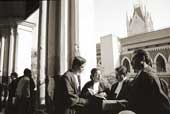 |
| FACE OFF: Disgruntled lawyers say block-level conciliation boards will be vulnerable to political abuse |
 |
They may don black, but right now all that they see is red. Lawyers are up in arms over “systematic” attempts to strip away their rights from the legal arena. The discontent against ‘anti-lawyer’ laws is brewing. Come February and the wrath of the legal fraternity may just burst into a protest movement the country is yet to witness.
With the state and Union governments planning to set up new courts and tribunals, many of which could function without lawyers, the advocates are worried about their future. “Attempts are being made to squeeze us out of the legal arena as much as possible. The governments, both in Calcutta and Delhi, are setting up legal bodies such as lok adalats and family courts, where lawyers are being debarred,” says Calcutta High Court Bar Association president Sardar Amjad Ali. Agitated lawyers, under the banner of the West Bengal Bar Council, took to the streets last month, staging a sit-in at Esplanade East. They also handed over a memorandum to governor Viren J. Shah, urging him to intercede on their behalf.
Both state and Union governments says the changes are being made to different acts (see box) to keep the law suited to the changing times. They say legal bodies such as lok adalats will ease the burden on the overstretched judiciary and help thousands of people whose cases have been dragging on in courts for years. The lawyers do not necessarily agree. “It’s an attempt to create a committed judiciary,” says Uttam Majumdar, chairman of the West Bengal Bar Council’s executive committee. “If the governments succeed, the judiciary will be at the beck and call of the executives.”
Earlier, lawyers say, lok adalats used to arbitrate between two sides locked in a court case and send its recommendations to the court. But now those are composed of three members (including two social workers) and can issue a final judgment on a dispute. “First, we were debarred from attending these lok adalats, now even the judiciary has been hit since these adalats can issue a ruling,” Ali says. And since the panchayat samitis will appoint two of the three members of a lok adalat, Ali points out there is “ a good chance that people with political standing will run these adalats”.
Similarly, the block-level conciliation board will be vulnerable to political abuse, lawyers say. “Where is the guarantee that this body will help people? The party in power can always misuse such bodies where lawyers are not allowed to fight for their clients,” Majumdar says. But what riles the lawyers most is the Centre’s “reluctance” to notify Section 30 of the Advocates Act. “We have long been demanding this notification, but nothing has been done so far,” Bikash Bhattacharya, joint secretary of the Democratic Lawyers Association, says.
This section gives the advocates registered with the Bar Council of India or the state bar councils the right to “practise” in all courts including the Supreme Court. It also allows the lawyers to appear before any tribunal or persons legally authorised to take evidence. Though this Act was passed in 1961, it hasn’t been notified yet. As a result, lawyers say they could do little as the government is increasingly barring their entry into the new courts and tribunals.
Even though lawyers have long been agitated about the stripping of their rights, no concerted movement has yet taken place. One main reason is that the lawyers’ bodies are divided along political lines. While the bar associations are dead against the block-level conciliation bill, the Democratic Lawyers Association, known for its pro-left stance, is all for it. “It’s a progressive and effective legislation and it should be passed without delay,” Bhattacharya of the Democratic Lawyers Association, says. The DLA, however, says it’s ready to set aside this issue and fight jointly for other demands of the lawyers.
Ali, who attended a Bar Council of India’s convention held in New Delhi in October 2003 to discuss the issues facing the lawyers, says the lawyers need to make the issues public. “What the state and Union governments are doing has huge social implications. It’s not just the lawyers. The public will be affected as well if political appointees are allowed to run the so-called legal bodies as lok adalats and family courts.” Ali says the bar councils, along with other lawyers associations, need to hold conventions and press conferences to “explain the issues and their importance to the public”.
The state bar council is all for a concerted movement and has called all the bar associations in February to draw up the blueprint of the protest movement. While the lawyers lock horns with the government in the forthcoming battle of wills, one can only keep one’s fingers crossed.










